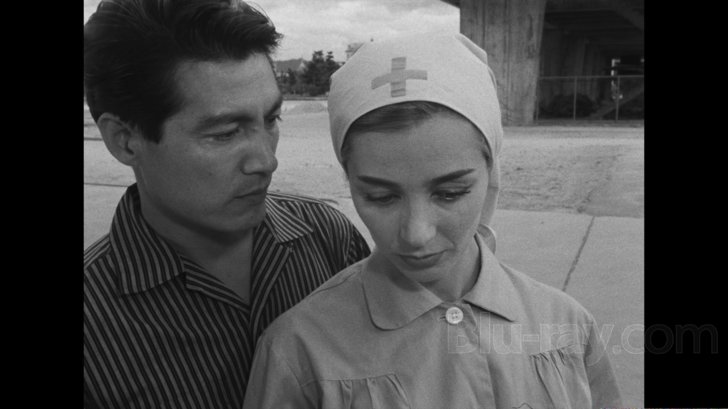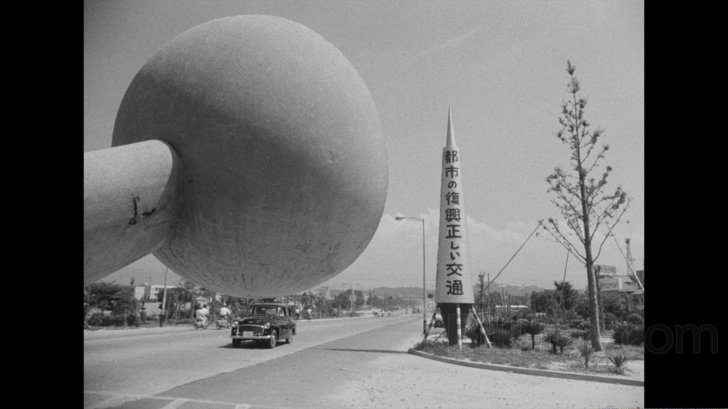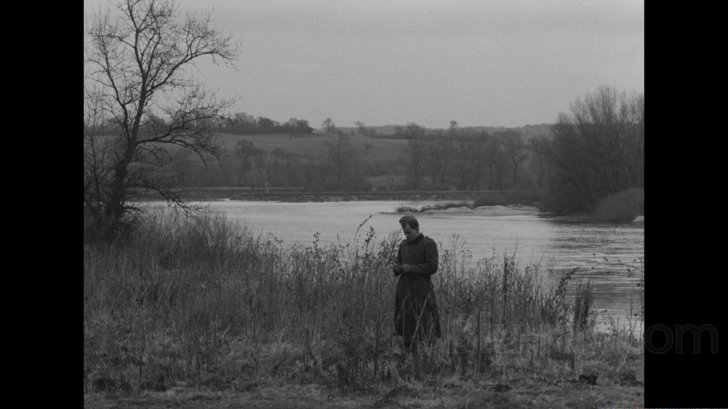Hiroshima mon amour Blu-ray Movie
HomeHiroshima mon amour Blu-ray Movie 
Criterion | 1959 | 90 min | Not rated | Jul 14, 2015
Movie rating
8.1 | / 10 |
Blu-ray rating
| Users | 4.8 | |
| Reviewer | 5.0 | |
| Overall | 4.8 |
Overview
Hiroshima mon amour (1959)
A French actress and a Japanese architect engage in a brief, intense affair in postwar Hiroshima, their consuming mutual fascination impelling them to exorcise their own scarred memories of love and suffering.
Starring: Emmanuelle Riva, Eiji Okada, Stella Dassas, Pierre Barbaud, Bernard FressonDirector: Alain Resnais
| Foreign | Uncertain |
| Drama | Uncertain |
| Romance | Uncertain |
| War | Uncertain |
Specifications
Video
Video codec: MPEG-4 AVC
Video resolution: 1080p
Aspect ratio: 1.37:1
Original aspect ratio: 1.37:1
Audio
French: LPCM Mono (48kHz, 24-bit)
Subtitles
English
Discs
50GB Blu-ray Disc
Single disc (1 BD)
Playback
Region A (locked)
Review
Rating summary
| Movie | 5.0 | |
| Video | 5.0 | |
| Audio | 5.0 | |
| Extras | 5.0 | |
| Overall | 5.0 |
Hiroshima mon amour Blu-ray Movie Review
Reviewed by Dr. Svet Atanasov June 22, 2015Alain Resnais' "Hiroshima mon amour" (1959) arrives on Blu-ray courtesy of Criterion. The supplemental features on disc include archival interviews with late French director; new filmed conversation with restoration specialist Davide Pozzi and cinematographer Renato Berta; archival interviews with actress Emmanuelle Riva; new video interview with film scholar Francois Thomas; new video interview with professor of music and journalism at USC Tim Page; audio commentary by film historian Peter Cowie; and more. The release also arrives with a 30-page illustrated booklet featuring an essay by critic Kent Jones and excerpts from a 1959 Cahiers du cinema roundtable discussion about the film. In French, with optional English subtitles for the main feature. Region-A "locked".

"I'd like to spend a few days with you somewhere sometime."
The majority of the events in Alain Resnais’ Hiroshima mon amour take place over the course of twenty four hours, but this isn’t immediately clear. At first it looks like one has been forced into a nightmare. There are corpses, people suffering, and a city that has been destroyed.
Later on, the graphic images are gradually replaced with images of new statues and buildings. Now there are people walking, cars and buses passing by. The city has been rebuilt and the sky has cleared.
Eventually, a man and a woman making love slowly emerge in front of the camera. They look like lovers, but after a while it becomes obvious that they don’t know much about each other. She (Emmanuelle Riva, Risky Business, Léon Morin, Priest) casually asks if the man is completely Japanese. He (Eiji Okada, Woman in the Dunes, The Face of Another) then asks if the woman’s eyes are green. They are in a hotel room somewhere in Hiroshima.
She and He have a long conversation -- both recall where they were when Hiroshima was destroyed. He was away, fighting the enemy, but his entire family was in Hiroshima. She was in her hometown of Nevers, where she had fallen in love with a handsome German soldier.
Before they leave the hotel room they arrange to see each other again, but both realize that their affair is coming to an end. In a few hours She will have to board a plane to Paris while He will greet his wife back home. They both have cheated, but for the first time since Hiroshima was destroyed they’ve felt alive, needed, and wanted.
Hiroshima mon amour was initially intended to be a documentary, but after Alain Resnais refused to complete it as such novelist and screenwriter Marguerite Duras’ transformed it into a romantic story.
The structure of the film is very unusual. Past and present frequently overlap and create a borderline surreal atmosphere with striking visual contrasts. For example, there are disturbing images of disfigured victims (taken from the Japanese reconstruction film Children of Hiroshima) that are inserted in elegantly lensed sequences with the naked bodies of the two lovers. The message behind these extreme contrasts is that as irremediable evil and self-destructive human beings may seem, if given a chance and encouraged they can always rediscover love and their passion for life.
Despite the powerful images, however, the film is completely devoid of political statements. A few slogans are seen during a sequence from the Japanese film Riva’s character was hired to do in Hiroshima, but there are no condemnations -- and rightfully so. After the graphic prologue, any attempt to comprehend the actions or question the morality of those responsible for the destruction of Hiroshima would have almost immediately collapsed the film.
The film features footage lensed by two cinematographers, Sacha Vierny and Takahashi Michio, whose management of light, shadow and space still feels strikingly modern.
The dark, quite melancholic soundtrack features beautiful piano pieces from two legendary composers: Georges Delerue (Contempt, The Conformist) and and Giovanni Fusco (L'Avventura, L'Eclisse).
Hiroshima mon amour Blu-ray Movie, Video Quality 

Presented in its original aspect ratio of 1.37:1, encoded with MPEG-4 AVC and granted a 1080p transfer, Alain Resnais' Hiroshima mon amour arrives on Blu-ray courtesy of Criterion.
The release uses as a foundation the recent excellent 4K restoration of the film, which was supervised by cinematographer Renato Berta (Rendez-vous, Merci pour le Chocolat) and completed by Argos Films, Technicolor and Groupama Gan Foundations, and Cineteca di Bologna in 2013. I initially saw it via Arte/Tamasa Distribution's release and thought that it was terrific, quite possibly one of the best restorations of a classic black-and-white film to come out of France.
Hiroshima mon amour is a film that blends two entirely different visual styles -- it was lensed by two different cinematographers, Sacha Vierny and Takahashi Michio -- and as a result there are some obvious shifts in terms of definition, clarity, and depth. The documentary footage looks appropriately rough and quite uneven. There are scratches, splices, cuts and damage marks. Density fluctuations are common as well (see screencapture #10). The fictional footage looks fantastic. Detail and clarity are enormously impressive and virtually everywhere the improvements in quality are quite dramatic. Image depth, in particular, is vastly improved and as a result during the outdoor panoramic shots one could see exceptionally small details that are not present on the old R1 DVD release of the film (see screencaptures #2, 4, and 11). Perhaps the most important improvements, however, pertain to shadow definition and overall image balance. Hiroshima mon amour is a film with a very delicate light/shadow balance which for obvious reasons was not accurately reproduced on the DVD release. The new restoration has effectively rebalanced the delicate intimate sequences where light is carefully captured by the camera to convey very specific feelings and emotions (see screencaptures #9 and 17 and see how nuanced the blacks and whites are). Grain is evenly distributed and well resolved throughout the entire film. There are no sharpening adjustments. Overall image stability is outstanding and when projected the film remains very tight around the edges. Finally, the encoding is very good. To sum it all up, this is an outstanding restoration of Hiroshima mon amour that has literally given the film a new life. I've seen it a couple of times now and I am absolutely convinced that it will remain the film's definitive presentation on the home video market. (Note: This is a Region-A "locked" Blu-ray release. Therefore, you must have a native Region-A or Region-Free Blu-ray player in order to access its content).
Hiroshima mon amour Blu-ray Movie, Audio Quality 

There is only one standard audio track on this Blu-ray release: French LPCM 1.0.Optional English subtitles are provided for the main feature.
I could immediately tell that the audio has been remastered. While dynamic intensity remains quite modest, the narration and dialog are fuller and far better rounded. Clarity and depth are very good. The melancholic music score also easily breathes throughout the entire film. There are no pops, audio dropouts, background hiss, or digital distortions to report.
Hiroshima mon amour Blu-ray Movie, Special Features and Extras 

- Revoir Hiroshima... - in this filmed video conversation, restoration specialist Davide Pozzi (L'Immagine Ritrovata), who oversaw the scanning and restoration of Hiroshima mon amour, and cinematographer Renato Berta (Au Revoir Les Enfants, Every Man for Himself), who served as a special consultant on the project, discuss some of the unique challenges the 4K restoration of Alain Resnais' film presented, the film's very delicate visual style (with specific comments addressing the management and balance of shadow and light), the new options digital technology gives restorers and filmmakers and how easy it is to irreversibly damage important films while they are being restored, etc. In French, with optional English subtitles. (12 min, 1080p).
- Alain Resnais - presented here are two archival interviews with the late French director.
1. 1961 - Alain Resnais quickly addresses the unique structure of Last Year at Marienbadand discusses his early work. The interview was conducted by Francois Chalais for the French television show Cinepanorama. In French, with optional English subtitles. (6 min, 1080i).
2. 1980 - in this audio excerpt, Alain Resnais explains how Hiroshima mon amour came to exist (with some very interesting comments about Chris Marker, who apparently removed himself from the project shortly after it was initiated) and highlights some of its key themes. The interview was included in the French radio program Le cinema des cineastes. In French, with optional English subtitles. (11 min, 1080i).
- Emmanuelle Riva - presented here are two archival interviews with the French actress.
1. 1959 - Hiroshima mon amour was Emmanuelle Riva's first major role. In this interview, the actress discusses her contribution to the film with Francois Chalais at the Cannes Film Festival in 1959, where the film was nominated for the prestigious Palme d'Or Award. In French, with optional English subtitles. (6 min, 1080i).
2. 2003 - in this video interview, the French actress recalls how she was approached to appear in Hiroshima mon amour, and discusses the shooting of the film in Japan, her interactions with Eiji Okada (who had to learn his lines phonetically), Alain Resnais' directing methods, the film's unusual structure (with some excellent comments about the flashbacks) and visual style, etc. The interview was conducted exclusively for Criterion in 2003. In French, with optional English subtitles. (20 min, 1080i).
- Francois Thomas on Hiroshima mon amour - in this new video interview, film scholar Francois Thomas, author of L'atelier d'Alain Resnais, discusses the production history of Hiroshima mon amour and its unique qualities. The interview was conducted exclusively for Criterion in Paris in March 2015. In French, with optional English subtitles. (27 min, 1080p).
- Memory and Meaning: The Music of "Hiroshima mon amour" - in this brand new interview, Tim Page, professor of music and journalism at USC, discusses Georges Delerue and Giovanni Fusco's soundtrack for Hiroshma mon amour and the manner in which it enhances the film's unique tone and atmosphere. The interview was conducted exclusively for Criterion in Cleveland in March 2015. In English, not subtitled. (11 min, 1080p).
- Commentary - film historian Peter Cowie discusses in great detail the production history of Hiroshima mon amour (with some terrific comments about screenwriter Marguerite Duras' contribution), the film's editing, pacing and visual style, multiple contrasting themes, etc. The commentary was recorded exclusively for Criterion in 2002.
- Booklet - 30-page illustrated booklet featuring: "Time Indefinite" by Kent Jones; "A Conversation About Hiroshima mon amour" (excerpted from a roundtable discussion by Jean Domarchi, Jacques Doniol-Valcroze, Jean-Luc Godard, Pierre Kast, Jacques Rivette, and Eric Rohmer, which was originally published in the July 1959 issue of Cahiers du cinema); and technical credits.
Hiroshima mon amour Blu-ray Movie, Overall Score and Recommendation 

A French actress and a Japanese architect have a brief but intense affair in postwar Hiroshima and remember how their lives changed after the end of the war in Alain Resnais' enormously atmospheric Nouvelle Vague masterpiece Hiroshima mon amour. The film has been recently restored in 4K and looks gorgeous in high-definition. Even though it is only June, I am convinced that at the end of the year this release will appear on many prestigious Top 10 lists. VERY HIGHLY RECOMMENDED.
Similar titles
Similar titles you might also like

The Cranes Are Flying
Летят журавли / Letyat zhuravli
1957

A Brighter Summer Day
牯嶺街少年殺人事件
1991

Summer Interlude
Sommarlek
1951

The Last Metro
Le dernier métro
1980

Lola
1961

Three Colors: Red
Trois couleurs: Rouge
1994

Children of Paradise
Les enfants du paradis
1945

The Rules of the Game 4K
La règle du jeu / 1959 Reconstructed Version
1939

Jules and Jim
Jules et Jim
1962

La Grande Illusion
Grand Illusion
1937

Bastards
Les Salauds / Slipcover in Original Pressing
2013

Ivan's Childhood
Ива́ново де́тство / Ivanovo detstvo
1962

The Earrings of Madame de...
Madame de...
1953

Betty Blue
37°2 le matin | Director's Cut
1986

Le silence de la mer
The Silence of the Sea
1949

Manon of the Spring
Manon des sources
1986

Yi Yi
2000

L' Atalante
1934

Le Petit Soldat
The Little Soldier
1963

A Woman Is a Woman
Une femme est une femme
1961